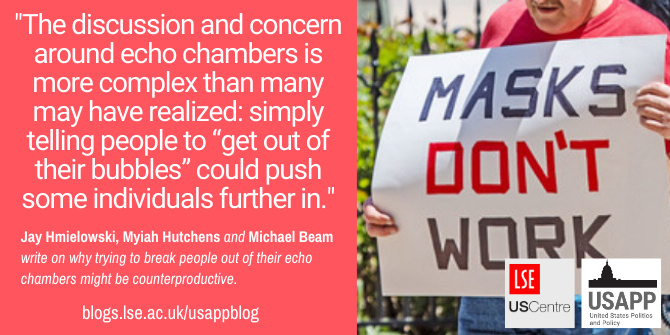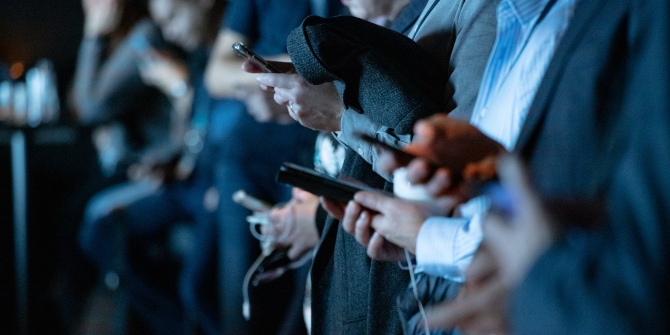

 Concerns over political polarization has led to calls for people to reach out and talk to those with opposing views. But, in new research, Jay Hmielowski, Myiah Hutchens and Michael Beam find that these conversations may in fact be pushing people further into their own partisan media echo chambers.
Concerns over political polarization has led to calls for people to reach out and talk to those with opposing views. But, in new research, Jay Hmielowski, Myiah Hutchens and Michael Beam find that these conversations may in fact be pushing people further into their own partisan media echo chambers.
Have you recently had a conversation with someone about wearing a mask to stop the spread of COVID-19? Our new research suggests that this discussion may have driven your conversation partners into a media echo chamber in which they seek out news that confirms their beliefs.
There is a general belief that it is important for people to reach beyond their communication bubbles. We tend to think that hearing opposing views leads people to better understand the world, become more tolerant of other people’s positions, and hold more moderate attitudes.
However, there is a growing concern that people are hearing views which oppose their own less and less.
Using the above example, if you’re liberal and were trying to convince a conservative to wear a mask, our research suggests that you may have just pushed that conservative further into their media echo chamber and increased their use of likeminded media channels such as Fox News. Likewise, the conversations liberals have with each other about how they think people aren’t doing enough to stop the spread of COVID-19 are likely to push liberals further into their own media echo chambers when they discuss politics with fellow liberals.
Popping ‘Information Bubbles’
People today talk about filter bubbles and echo chambers to describe a situation where a person only consumes information that supports their prior beliefs. Indeed, past research has highlighted that online media and cable news provide people with the opportunity to avoid hearing opposing views. When people only hear their preferred side of a debate, they may become less tolerant, feel more negative towards those on the other ‘side’ (i.e., how members of one political party feel about the other), and become more likely to have extreme political views. While some research suggests that these concerns with media echo chambers might be overblown, there is a consistent line of inquiry showing that people are walling themselves off from opposing views.
So where can people still hear opposing views? One of the last vestiges of hearing different opinions is in talking to others. Research has highlighted that speaking to friends, family, and acquaintances is an important way to hear opinion-challenging positions. So, it’s important to examine the effects of talking to people who hold differing views in our day-to-day conversations.
Interestingly, the effects of having supportive and challenging conversations vary based on political ideology.
First, our research shows that liberals who had supportive conversations, where they spoke to someone who held similar views as their own, tended to increase their use of supportive media like MSNBC and decrease their use of challenging media such as Fox News. Indeed, liberals talking to fellow liberals increased trust in liberal leaning news outlets, which then increased their use of liberal leaning news sources. By contrast, these same conversations decreased trust in conservative news sources, ultimately resulting in decreased use of these same outlets. Essentially, what we find with liberals is evidence of the common concern of echo chambers. It seems that likeminded, day-to-day conversations among liberals is driving these individuals further into their media echo chamber.

“bIMG_1235” by Becker1999 is licensed under CC BY 2.0
When we looked at conservatives, however, we found that media echo chambers were motivated by participating in challenging conversations, where an individual talks to someone who holds opposing views from their own. Indeed, conservatives trusted liberal outlets less and were less likely to seek information from these outlets after talking to someone who challenged their views. In addition, discussions with liberals led conservatives to report higher levels of trust in preferred conservative news outlets and, thus, increased their use of these same sources. Essentially, when conservatives engaged in “ideal” cross-party discussions, we found a back-firing effect, where those conversations pushed them further into their media echo chamber. When conservatives talk to other conservatives, it has no impact on their media trust or media use.
Conversations Can Drive People Further into Echo Chambers
So what does this mean for today’s democracy? Many videos have been posted online showing interactions tied to disagreements about wearing facemasks and social distancing. To some extent, our data explain the conservative push back when they are asked to wear a mask by associates at a business or by their fellow citizens. Indeed, these videos show people acting out and refusing to wear the mask. After this interaction with a liberal at a store, these individuals may look to conservative news sources to an even greater extent, which have argued that mask mandates infringe on individual freedoms, because they view these outlets as more trustworthy.
These anecdotes and our findings suggest that if liberals approach people who are not adhering to social distancing or wearing a mask, these interactions may result in these individuals holding more extreme attitudes regarding policies and behaviors tied to COVID-19. Indeed, they may be less likely to wear a mask in the future or be more willing to go out with friends and family when they should be avoiding others.
After the interaction with the conservative, this same liberal individual could then talk to a fellow liberal about what happened. Much like the conservative, this fellow liberal will turn to supportive media and end up holding more extreme views. The liberal experiencing the story could end up more committed to engaging in these behaviors, but also become less willing to seek out and talk to other people they believe are conservative in the future.
Our research demonstrates that the discussion and concern around echo chambers is more complex than many may have realized: simply telling people to “get out of their bubbles” could push some individuals further in.
- This article is based on the paper, ‘Talking Politics: The Relationship Between Supportive and Opposing Discussion With Partisan Media Credibility and Use’ in Communication Research.
Please read our comments policy before commenting.
Note: This article gives the views of the author, and not the position of USAPP– American Politics and Policy, nor of the London School of Economics.
Shortened URL for this post: https://bit.ly/3idkAsZ
About the authors
 Jay Hmielowski – The University of Florida
Jay Hmielowski – The University of Florida
Jay Hmielowski is an Assistant Professor in the Department of Public Relations at the University of Florida. His research interests include environmental, science, and political communication. He is interested in understanding why different messages are effective or ineffective at changing people’s attitudes and beliefs associated with various environmental, science, and political issues. He is also interested in how people’s attitudes and beliefs affect their information seeking behaviors.
 Myiah Hutchens – The University of Florida
Myiah Hutchens – The University of Florida
Myiah Hutchens is an assistant professor in the Department of Public Relations at the University of Florida. Her research interests focus on political communication. Specifically, her work centers on how communication functions in democratic processes – that is, to help or hinder political processes. Her research generally focuses on what leads people to seek out diverse perspectives – particularly views they disagree with – and how individuals then process that disagreement.
 Michael Beam– Kent State University
Michael Beam– Kent State University
Michael Beam is the director of the School of Emerging Media and Technology at Kent State University. His research investigates the impact of media systems on the process of information creation, exposure, and processing. His research has focused on the impact of information systems using personalized algorithms on news exposure and health communication, the influence of partisan media sources on political polarization and political information processing, and how new media systems change information distribution patterns.





To advertisers I will return to watching the news when it returns to a professional standard. I can’t believe this needs to be said. News is supposed to be impartial and unbiased. I am truely disgusted by the standards of journalism today. You should all be ashamed of yourselves for ruining a once respected profession. I am not nieve. Clearly people will always have their opinions. You are professionals and a commitment to impartiality is a requirement. Maybe what we need is another term for this vocation because all main stream media definately are not providing journalism. What I will not do is consume media that has even a hint of partisan roots. Hear that advertisers I am unplugging. Fix this now before it can’t be.